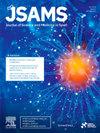Differences between the sexes in concussion knowledge and attitudes in community football (soccer) players in New Zealand
IF 3
2区 医学
Q1 SPORT SCIENCES
引用次数: 0
Abstract
Objectives
To evaluate self-reported concussion knowledge and attitudes in community football players in New Zealand, comparisons were made between the sexes and those with and without history of concussion.
Design
Cross-sectional cohort study.
Methods
The Rosenbaum Concussion Knowledge and Attitudes Survey (RoCKAS) was used for data collection and analysis. Players were recruited through the New Zealand Football registered player database.
Results
Seventy-four players had data eligible for inclusion (55 % female). Thirty-four players (45 %) had previously diagnosed concussion (56 % female). Mean Concussion Knowledge Index (CKI) scores were significantly (p = 0.002) higher for male (20.8 ± 1.4) than female (19 ± 3.7) players. There were no significant sex differences in mean Concussion Attitude Index (CAI) scores (female 63.7 ± 11.4, male 65.6 ± 6.0; p = 0.427). Surprisingly, 32 % female and 39 % male players indicated that they would play on with symptoms of concussion. Comparison within female players showed a significantly higher CKI (20.3 ± 1.7 versus 18.8 ± 2.6; p = 0.025) and higher CAI (66.5 ± 4.9 versus 64.1 ± 5.9; p = 0.151) in players with a history of concussion. There were no within male player trends for CKI or CAI.
Conclusions
Male players had a notably higher concussion knowledge (CKI) than female players. Females with a previously diagnosed concussion also had a notably higher CKI than female players with no concussion history. Therefore, healthcare professionals could play a key education role when managing players with concussion. Given over a third of players indicated that they would play on with symptoms of concussion, education should focus on short- and long-term impacts of concussion and potential consequences of concussion.
新西兰社区足球运动员在脑震荡知识和态度方面的性别差异。
目的:评估新西兰社区足球运动员自我报告的脑震荡知识和态度,比较有和没有脑震荡史的男女之间的差异。设计:横断面队列研究。方法:采用Rosenbaum脑震荡知识和态度调查(RoCKAS)进行资料收集和分析。球员是通过新西兰足球注册球员数据库招募的。结果:74名运动员的数据符合纳入条件(55% %为女性)。34名球员(45 %)之前被诊断为脑震荡(56 %为女性)。男性运动员的平均脑震荡知识指数(CKI)得分(20.8 ± 1.4)显著高于女性(19 ± 3.7),差异有统计学意义(p = 0.002)。脑震荡态度指数(CAI)平均分性别差异无统计学意义(女性63.7 ± 11.4,男性65.6 ± 6.0; = 0.427页)。令人惊讶的是,32% %的女性球员和39% %的男性球员表示,他们会带着脑震荡的症状继续比赛。相比之下,女性玩家的CKI明显更高(20.3 ± 1.7 vs . 18.8 ± 2.6;p = 0.025)和更高的CAI(66.5 ± 4.9 vs 64.1 ± 5.9;P = 0.151)。在男性玩家中没有CKI或CAI的趋势。结论:男性运动员的脑震荡知识(CKI)显著高于女性运动员。先前诊断为脑震荡的女性球员的CKI也明显高于没有脑震荡史的女性球员。因此,医疗保健专业人员在管理脑震荡球员时可以发挥关键的教育作用。鉴于超过三分之一的球员表示他们会在脑震荡的症状下继续比赛,教育应该关注脑震荡的短期和长期影响以及脑震荡的潜在后果。
本文章由计算机程序翻译,如有差异,请以英文原文为准。
求助全文
约1分钟内获得全文
求助全文
来源期刊
CiteScore
7.40
自引率
10.00%
发文量
198
审稿时长
48 days
期刊介绍:
The Journal of Science and Medicine in Sport is the official journal of Sports Medicine Australia (SMA) and is an an international refereed research publication covering all aspects of sport science and medicine.
The Journal considers for publication Original research and Review papers in the sub-disciplines relating generally to the broad sports medicine and sports science fields: sports medicine, sports injury (including injury epidemiology and injury prevention), physiotherapy, podiatry, physical activity and health, sports science, biomechanics, exercise physiology, motor control and learning, sport and exercise psychology, sports nutrition, public health (as relevant to sport and exercise), and rehabilitation and injury management. Manuscripts with an interdisciplinary perspective with specific applications to sport and exercise and its interaction with health will also be considered.

 求助内容:
求助内容: 应助结果提醒方式:
应助结果提醒方式:


